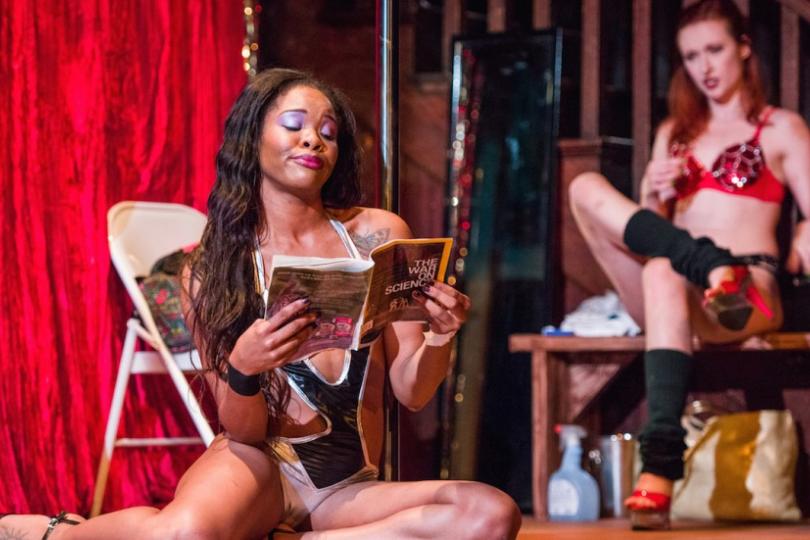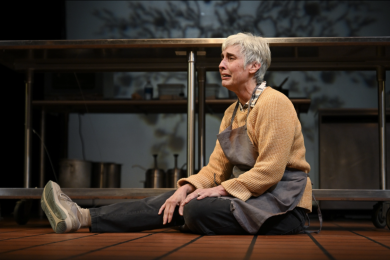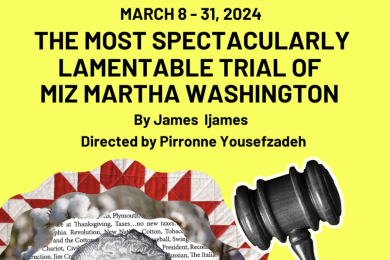Down in the valley

The name of the play – Pussy Valley – could evoke a fertile land of liberation, where women are free to explore and express a limitless supply of erotic power. For some of you, Pussy Valley might bring to mind a sexual utopia, where naked ladies, ready and willing, await their lovers’ most secret fantasies. Or maybe Pussy Valley is a hot, humid ecosystem constantly ravaged and threatened by others’ greed for its hidden natural resources.
Set over a series of sweltering nights, Katori Hall’s world premiere play allows “Pussy Valley” to take many different shapes. The employees and patrons of the Pink Pony, a gentlemen’s club in the Mississippi Delta, all have their own ideas about what their sexuality can do for them and how it leaves them vulnerable. Get ‘Em Gidget (Megan Rippey) treats pole dancing as a competitive sport, while Miss Mississippi (Joetta Wright) is using it to support a family. Mercedes (Jasmine Hughes) wields her sexuality like a sword and shield; pole dancing newbie Autumn Night (Tatiana Williams) is less ready to see dancing as a source of power.
Katori Hall is singularly nonjudgmental when it comes to these women’s messy lives. All four – plus their boss, Uncle Clifford, a diva in drag (in a knock-out performance by Nico Annan) – have plenty of stage time to develop their stories, so no narrative is weighted down with a sense of moral favoritism. The consequence of such well-rounded characters, however, is a play that is three hours long.
Never boring, sometimes tiring
So although Pussy Valley was never boring, I wasn’t always sure where it was going. There are moments of stillness and poetry in the play that distill raw truths from each character’s personal chaos; then the kaleidoscope shifts, the pieces are rearranged, and some of the sense of clarity is lost in the shuffle of a new dramatic development. There is so much happening that the play’s overwhelming feeling is one of unending cycles of struggle and violence, in which individual strengths and aspirations are overshadowed by forces beyond their control.
Given how often their world seems to be shaken by traumatic life events, it is easy to see how hard it is for these women to take steps towards leaving the world of pole dancing. In a theatrical setting, however, the convergence of so many dramas – abusive relationships, drug abuse, sexual violence – feels excessive. This isn’t to say that the play is sensationalistic. Hall has a keenly objective eye for the power dynamics, both interpersonal and societal, that are the most powerful drivers of these characters’ lives. The play gives us a view into the ways that family history and social networks shape individual choices, and the ways that individuals give intense personal meaning to even those choices that are socially marginalized. But to put so many of these storylines into one play gets tiring after three hours, no matter how much Katori Hall and director Nataki Garrett assiduously avoid melodrama.
Of the many plot points in Pussy Valley, there was just one that didn’t ring true, which unfortunately leaves some significant moments in Act Two on shaky ground. Without excessive spoilers: there is a crime that occurs just before intermission which sends a minor character to the hospital. The perpetrator is served with a restraining order; however, I couldn’t figure out why he wouldn’t be in jail for this type of act, other than the fact that it is more dramatically interesting for him to be free. (Maybe someone can help me with this in comments below.)
About pole dancing
But to set aside the play’s scattered narrative structure for a moment, this is also a play about pole dancing. The actors spent months training for their roles, so apart from delivering amazing theatrical performances, all four women also exhibit some phenomenal skill on the pole. This was really cool to watch, but it made for a complicated viewing experience. At first, I hesitated to cheer for the actors’ grace and athleticism, because it felt as though I was also objectifying their characters. But each perfectly-executed pole trick was a little reminder that these women are not sex workers, but rather actors with extensive training in pole dancing. We cheered for the artistic prowess and training on the poles installed on the Mixed Blood stage--not for the gyrations in the VIP room at the Pink Pony. These performances slowly tore down the fourth wall, freeing us to applaud these talented performers without feeling complicit in the misogyny behind the actual sex industry.
All this dancing is obviously fun to watch. The moves are impressive, and it’s honestly a relief to take a break from the heavy events in the play and watch these women fly around the pole. But I’m not sure we should be let off the hook so easily. This is a society that breeds poverty and sexual inequality, without providing sufficient support where it’s most needed. Poor women often turn to the sex industry as their only way out, and as beneficiaries of that economic structure, we are all implicated, whether we’ve been to a strip club or not.
Pussy Valley spends an awful lot of time humanizing its characters, drumming home the point that they are more than just blank canvases on which customers project their sexual fantasies. But it also keeps us at a safe distance. From our viewing station high up on the hillside around Pussy Valley, we can sympathize with the characters and admire the actors, but we don’t ever have to face what it would mean to set foot in those lowlands ourselves – or what kind of roadmap its residents would need to be able to find their way out.




